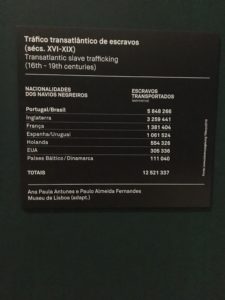‘We can say anything, language has no limits’ – Georg Steiner.

Saudade is a unique word in Portuguese that has no direct translation in English. It means something like a melancholic or nostalgic desire for a person, place or event far away, either in space or time.
Esperto is another example. On the ball, brainy, smart, canny, with-it and intuitive, all help to approximate its meaning. In Brazil, the word can also mean someone who traps or fools others into trouble.

The Portuguese language exists more than 800 years and is spoken by over 260 million people (3,7% of the world population). It is – after Mandarin/Chinese, English, Spanish, Hindustani and Arabic – the sixth most used language in the world.

Official vernacular in the nine CPLP (Portuguese Language Speaking Community) countries – Angola, Brazil, Cape Verde, Guinea Bissau, Equatorial Guinea, Mozambique, Portugal, Sao Tome & Principe and East Timor, in use on virtually every continent and predicted to be spoken by over 380 million people in 2050.

Its expansion is closely linked to the history of the Portuguese Discoveries in the 15th century and still today echoes of Portuguese can be heard in the streets of Goa (India), Malacca (Malaysia) and Macau (China).
Although it was Portugal that expanded the language in the past, nowadays Portuguese-speaking countries like Brazil, Angola and Mozambique are mostly responsible for the growing interest in the Portuguese language.

Originating from Latin – from which it evolved into Galician-Portuguese – the language that would become Portuguese, began to be spoken in the Northwest of the Iberian Peninsula around the 6th century. It was expanded to the South with the Christian reconquest, at the same time influenced by Arabic from which many words derive, such as almofada (pillow), aldeia (village), alface (lettuce), alfândaga (customs) and açafrão (saffron).

The testament of King Afonso II – dated June 17, 1214 – is considered as one of the oldest written documents in Portuguese. It marks the beginning of the period of ancient Portuguese that would last until the publication in 1572 of the first book in modern Portuguese, The Lusiads, Portugal’s national epic by Luis Camões.
The United Nations Educational, Scientific and Cultural Organisation (UNESCO) declared in November last year the 5th of May as ‘World Portuguese Language Day’. Unfortunately, the opening celebration could only take place online as a result of the coronavirus pandemic.
Stay healthy Fique saudável (pic Público/Sapo)

 Portugal’s successful battle against Covid-19 has come under international media spotlight and regarded by many as exemplary. With a quarter of the population of big brother Spain, Portugal has around one-tenth of the number of cases and a three times lower mortality rate.
Portugal’s successful battle against Covid-19 has come under international media spotlight and regarded by many as exemplary. With a quarter of the population of big brother Spain, Portugal has around one-tenth of the number of cases and a three times lower mortality rate.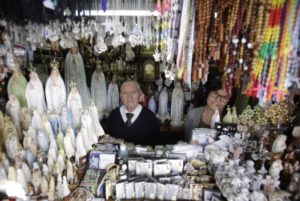 There are a number of different theories for why the virus has caused so much less suffering than in neighbouring Spain.
There are a number of different theories for why the virus has caused so much less suffering than in neighbouring Spain.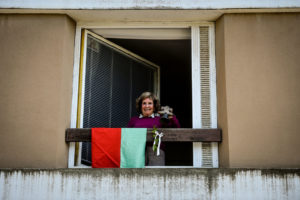
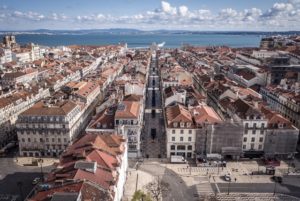 Lisbon’s streets are left to joggers and cats, its glorious beaches cordoned off, the economy asphyxiated, border crossings to Spain sealed, schools and universities
Lisbon’s streets are left to joggers and cats, its glorious beaches cordoned off, the economy asphyxiated, border crossings to Spain sealed, schools and universities  Nevertheless, the government prepares to gradually
Nevertheless, the government prepares to gradually 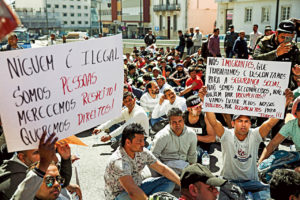 All migrants, including asylum seekers with pending applications at immigration (Serviço de Estrangeiros e Fronteiras), will be treated as permanent residents until at least July 1, granting them full access to the National Health Service, welfare benefits, bank accounts, work, and rental contracts during the corona outbreak.
All migrants, including asylum seekers with pending applications at immigration (Serviço de Estrangeiros e Fronteiras), will be treated as permanent residents until at least July 1, granting them full access to the National Health Service, welfare benefits, bank accounts, work, and rental contracts during the corona outbreak. The
The 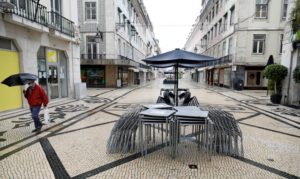 Portugal declared the State of
Portugal declared the State of  Schools in Portugal even closed before any deaths were registered.
Schools in Portugal even closed before any deaths were registered. Portugal is doing comparatively well so far. But the authorities’ advice to stay at home and keep distance has to be maintained to prevent further suffering. Researchers at the Imperial College in London suggested that without these measures deaths in Portugal could reach 70,000.
Portugal is doing comparatively well so far. But the authorities’ advice to stay at home and keep distance has to be maintained to prevent further suffering. Researchers at the Imperial College in London suggested that without these measures deaths in Portugal could reach 70,000.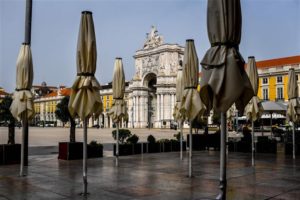 With the peak of the virus predicted in May, it is becoming increasingly clear that quarantine measures in Portugal probably have to stay in force till the end of June.
With the peak of the virus predicted in May, it is becoming increasingly clear that quarantine measures in Portugal probably have to stay in force till the end of June. To finish off with a quote of the famous Dutch footballer Johan Cruijff ‘ every disadvantage has its advantage.’
To finish off with a quote of the famous Dutch footballer Johan Cruijff ‘ every disadvantage has its advantage.’ When the number of confirmed coronavirus cases surpassed the 1,000 mark – with six reported deaths – the Portuguese Government announced the State of
When the number of confirmed coronavirus cases surpassed the 1,000 mark – with six reported deaths – the Portuguese Government announced the State of 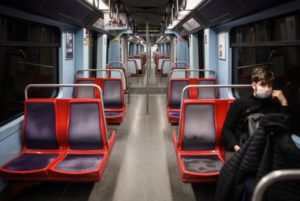 Non-essential business and schools closed. People urged to leave their houses only for food, medicines and walking the dog. Remote working from home became the rule.
Non-essential business and schools closed. People urged to leave their houses only for food, medicines and walking the dog. Remote working from home became the rule. 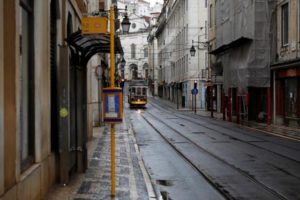 ‘Social distancing’ and ‘protecting the elderly’ have become keywords in the fight against the new virus – Severe Acute Respiratory Syndrome Corona Virus 2 (SARS-CoV-2).
‘Social distancing’ and ‘protecting the elderly’ have become keywords in the fight against the new virus – Severe Acute Respiratory Syndrome Corona Virus 2 (SARS-CoV-2). The intention of prime minister Antonio Costa is not to close the country down – like in France – even though he has the constitutional support with this State of Emergency to do so. The government, however, will – given the developments in Spain and Italy where the death tolls are the worst in Europe – implement further restrictions if necessary.
The intention of prime minister Antonio Costa is not to close the country down – like in France – even though he has the constitutional support with this State of Emergency to do so. The government, however, will – given the developments in Spain and Italy where the death tolls are the worst in Europe – implement further restrictions if necessary. The Socialist Government of Antonio Costa is convinced that upgrading Montijo Air Force Base 6 on the south bank of Lisbon’s Tagus estuary, is the best option.
The Socialist Government of Antonio Costa is convinced that upgrading Montijo Air Force Base 6 on the south bank of Lisbon’s Tagus estuary, is the best option. In addition, the national airline
In addition, the national airline  Moreover, at least 30.000 citizens in the Netherlands have signed a petition objecting to the ‘ecologically disastrous plan.’ It concerns the survival of Netherlands national
Moreover, at least 30.000 citizens in the Netherlands have signed a petition objecting to the ‘ecologically disastrous plan.’ It concerns the survival of Netherlands national 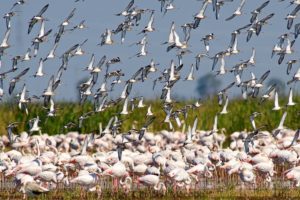 Researchers also say birds are at risk of colliding with aircraft and will be driven away by the noise. The reaction of Secretary of State Alberto Souto de Miranda was stunning ‘people should not worry because birds are not
Researchers also say birds are at risk of colliding with aircraft and will be driven away by the noise. The reaction of Secretary of State Alberto Souto de Miranda was stunning ‘people should not worry because birds are not  The latest obstacle in starting construction on a 1.3 billion euro project are two Communist-led
The latest obstacle in starting construction on a 1.3 billion euro project are two Communist-led  In the last four years over
In the last four years over  Descendants to
Descendants to  Many of the expelled Jews have maintained the Portuguese language (or Ladino, a merger of Castilian and Portuguese), the religious and food rites of Jewish worship in Portugal and preserved family surnames, records, objects kept for generations and documents proving their Portuguese origin.
Many of the expelled Jews have maintained the Portuguese language (or Ladino, a merger of Castilian and Portuguese), the religious and food rites of Jewish worship in Portugal and preserved family surnames, records, objects kept for generations and documents proving their Portuguese origin. Lisbon is Europe’s Green Capital 2020. A recognition of the work the city has been done over the past years towards a greener and more people-friendly city (
Lisbon is Europe’s Green Capital 2020. A recognition of the work the city has been done over the past years towards a greener and more people-friendly city (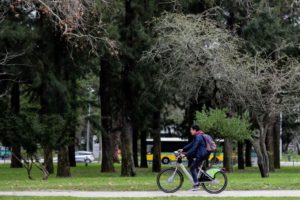 Extension of
Extension of  To date, the capital has around 800.000 trees. Lisbon’s biggest – 10 km² sized – Monsanto park, not only generates much-desired shadow but captures CO2 as well. One of the first initiatives of the City Council in January has been the planting of
To date, the capital has around 800.000 trees. Lisbon’s biggest – 10 km² sized – Monsanto park, not only generates much-desired shadow but captures CO2 as well. One of the first initiatives of the City Council in January has been the planting of  Although the sale of electric cars doubled in 2019, compared to the previous year, there are only 1000 public
Although the sale of electric cars doubled in 2019, compared to the previous year, there are only 1000 public 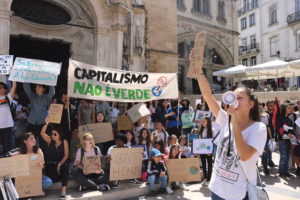 It is difficult to understand why the city is mobilized to be the Green Capital 2020 when major political decisions point into the
It is difficult to understand why the city is mobilized to be the Green Capital 2020 when major political decisions point into the  In Portugal – where palliative care is no priority – a first training course of end-of-life doulas has started last September.
In Portugal – where palliative care is no priority – a first training course of end-of-life doulas has started last September. The term doula originates from ancient Greece meaning a helping individual; a servant or in extreme cases, a slave. Since the 1960s the term is in use for women who support pregnant mothers during childbirth. Unlike midwives, they do not serve in a medical capacity.
The term doula originates from ancient Greece meaning a helping individual; a servant or in extreme cases, a slave. Since the 1960s the term is in use for women who support pregnant mothers during childbirth. Unlike midwives, they do not serve in a medical capacity. ‘It will be up to the doula to act as an intermediary between the needs of each other, to try to harmonize conflicts’, explains nurse
‘It will be up to the doula to act as an intermediary between the needs of each other, to try to harmonize conflicts’, explains nurse  The work of doulas doesn’t replace that of health professionals and has nothing to do with
The work of doulas doesn’t replace that of health professionals and has nothing to do with  What began in a country with a large following Christianity as an alternative food to the Church’s fasting of meat during Lent, later became associated with Christmas. The traditional meal is called Consoada. It consists of boiled salt-dried codfish – soaked for 2 or 3 days to remove most of the salt – boiled potatoes, boiled eggs, boiled chickpeas, and boiled cabbage accompanied with a dressing of chopped raw onion, garlic, parsley, and lots of olive oil!
What began in a country with a large following Christianity as an alternative food to the Church’s fasting of meat during Lent, later became associated with Christmas. The traditional meal is called Consoada. It consists of boiled salt-dried codfish – soaked for 2 or 3 days to remove most of the salt – boiled potatoes, boiled eggs, boiled chickpeas, and boiled cabbage accompanied with a dressing of chopped raw onion, garlic, parsley, and lots of olive oil!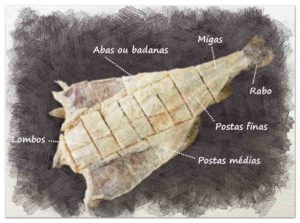 Cod (bacalhau) is the nation’s favourite dish. According to the locals, there are 365 different ways to prepare it. Well-known
Cod (bacalhau) is the nation’s favourite dish. According to the locals, there are 365 different ways to prepare it. Well-known 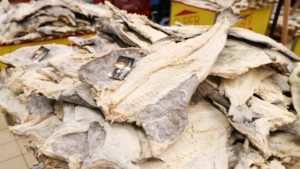 The fish isn’t native to Portuguese waters. The Vikings – who used to take air-dried cod on their sea voyages – probably introduced bacalhau in Portugal. To preserve it longer, the Basques went a step further by salting the fish before drying.
The fish isn’t native to Portuguese waters. The Vikings – who used to take air-dried cod on their sea voyages – probably introduced bacalhau in Portugal. To preserve it longer, the Basques went a step further by salting the fish before drying.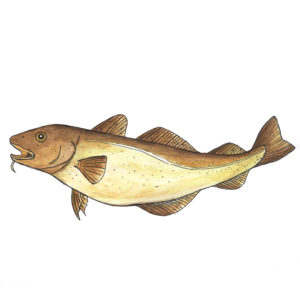 Traditional fishing far away from home was easier said than done. Each fisherman was assigned a dory – a small flat-bottomed fishing boat – which was lowered from the mothership into the ice-cold waters once they reached the banks of Newfoundland. The fisherman then ventured all alone into the foggy sea and was left to his own till his boat was filled the day’s catch. The documentary
Traditional fishing far away from home was easier said than done. Each fisherman was assigned a dory – a small flat-bottomed fishing boat – which was lowered from the mothership into the ice-cold waters once they reached the banks of Newfoundland. The fisherman then ventured all alone into the foggy sea and was left to his own till his boat was filled the day’s catch. The documentary 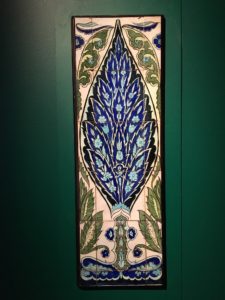
 This balance began to fall apart in the 14th century, when the trend to isolate the non-Christian communities intensified, resulting in segregation laws and Jewish and Moorish quarters. Discrimination against Jews and Muslims grew steadily culminating in the Edict of Expulsion – signed by King
This balance began to fall apart in the 14th century, when the trend to isolate the non-Christian communities intensified, resulting in segregation laws and Jewish and Moorish quarters. Discrimination against Jews and Muslims grew steadily culminating in the Edict of Expulsion – signed by King 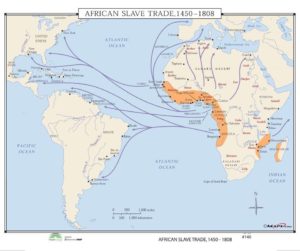
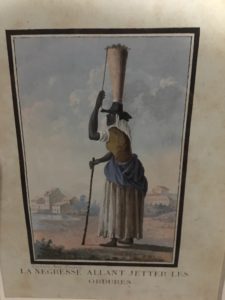 The dirtiest work practiced by enslaved African women was that of collecting and carrying human waste, because of the weight of the excrement pot, its filthy content and the long distances they had to travel with it on their head. Not only in ancient Lisbon was the black women the hand that cleaned, even in our modern society this phenomenon continues to be very persistent!
The dirtiest work practiced by enslaved African women was that of collecting and carrying human waste, because of the weight of the excrement pot, its filthy content and the long distances they had to travel with it on their head. Not only in ancient Lisbon was the black women the hand that cleaned, even in our modern society this phenomenon continues to be very persistent!